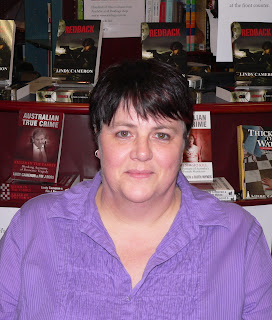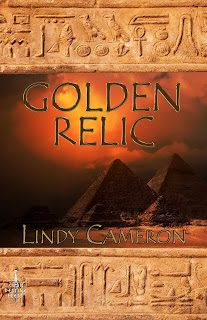Our guest today is Lindy Cameron. Lindy is also the author of the Kit O’Malley PI
trilogy Blood Guilt, Bleeding Hearts and Thicker Than Water; the archaeological
mystery Golden Relic; the action thriller Redback; and the sf crime Feedback. She’s
also co-author of the True Crime collections: Killer in the Family & Murder
in the Family, with her sister Fin J Ross; and Murderous Women, with Ruth Wykes. Lindy is a National Co-Convenor of Sisters
in Crime Australia, the Publisher of Clan Destine Press, and is currently
working on a series of historical novellas featuring time-travelling
archaeologists. You can connect with Lindy via her website, Twitter and Facebook.
As Lindy is sitting on our Pathways to
Publication panel on Sunday 10 September at the HNSA 2017 Melbourne conference,
we thought we should find out more about her.
As the national co-convenor of Sisters in Crime Australia, and owner and publisher of Clan Destine Press, can you tell us what first prompted your interest in reading and writing crime fiction and nonfiction?
My reading life began with The Famous Five, progressed through Biggles and James Bond to authors Helen McInnes and Agatha Christie to Sara Paretsky and the modern women crime writers.
There was actually little chance I’d write
anything but crime and action.
Why, in your opinion, are writers attracted to writing historical crime fiction dating back through the centuries, and/or exploring true crimes?
Plot – I think. If you have a murder or a
mystery to hang your historical garb around then, as a writer, you’re playing
in the best of both worlds. A crime or mystery is a great way to introduce
readers to a time and place far removed from them; and in a way that does not
have to rely on the Big Names of History to tell the story. A mystery in
Ancient Greece or Rome can be all about the citizens, or the slaves or the
merchants. A murder at any time in history is still a murder that needs
solving; or even perpetrating! A mystery stands right next to a quest as a great foundation for any historical
novel.
Can you tell us a little about how you go about researching and writing your crime novels? What sorts of resources do you use?
I’m currently writing historical fiction: a
mosaic novel (series of novellas) with the about time travelling archaeologists
and adventures.So, my research takes me into the gurgling
black hole whole of google and all that the internet opens up to writers researching
anything really, but the past in particular. There is SO much information to find, and ways to track down original sources,
or actual books on topics on everything ancient, like weapons, poisons and
Amazons, female archaeologists and aviatrixes from the 19th-21st centuries. Research for my (contemporary) crime
fiction follows the same route, with the added bonus that, as a member of
Sisters in Crime, I have access to a Sisterly host of real-life experts in
real-world crime solving. Sisters in Crime Australia, by the way, has
been celebrating, promoting and having fun with women's crime writing for 25
years. It is, arguably, one of the best groups in the country for readers,
viewers and writers of anything.
Are you a 'plotter' or a 'pantser'. What's next in the pipeline for you?
I’m a plotting-pantser – depending on what
I’m writing. With ‘time travel’ stories a certain amount of plotting s vital or
your character might end up scrubbing themselves out of their own future.
I usually start with an idea that gets pantsed; then I stop to work out where on earth I’m going, outline a few plot details, then rush off again like a loon.My current project is a series of novellas set in different time periods but all linked to the concept of the first in the series:
I usually start with an idea that gets pantsed; then I stop to work out where on earth I’m going, outline a few plot details, then rush off again like a loon.My current project is a series of novellas set in different time periods but all linked to the concept of the first in the series:
A tale of Amazons and the Great Library of Alexandria in which a
time-travelling archaeologist and a writer from the 21st century meet the
great-great-great granddaughter of Queen Thalestris and Alexander the Great.
Which is more important to you: historical authenticity or accuracy?
They are both vital – but it depends
whether a story is being presented as fact. In my first novel, Golden Relic, I invented
an Incan myth to suit the modern mystery that was unfolding. But the myth was
rooted in heaps of research and tied to a fabricated (by me) account by a
Spanish missionary of an inciting incident. Everything I created had a basis in
some kind of fact, so the story was ‘authentic’ rather than accurate.
How important is it to you to feature gay and lesbian protagonists in your books and at the same time raise issues of concern to the LBGTQIA community?
In terms of my writing, I’m a writer first; then a lesbian writer. My first book had a mention of a gay guy; my next three books (the O’Malley Mysteries) star a lesbian private investigator; my fifth novel - the action adventure Redback – is more gay subtext than overt but it’s there. It’s very important to me write with as much diversity as possible. But I don’t write anything to raise LGBTQIA issues. Yes, they may present themselves, but that is never my starting point. I want my characters to be themselves without drawing attention to themselves by waving a big rainbow or feminist or political placard. It doesn’t mean I shy away from anything either. I am what I am; just like my characters.What made you decide to become a publisher as well as an author?
Ah, the $6 million question. Because I was brave;
and stupid. All too often my writer friends and I would
say: ‘If I ran my own publishing company… I would publish that; or encourage
this; or develop that idea. I finally realised I had most of the necessary skills; or knew talented people
who did – so I thought, why not give it a go. As I love genre fiction, of all kinds, that
was the pond I jumped in – and was lucky enough to launch Clan Destine Press in
2010 with Out of the Black Land, a previously unpublished historical novel by
Kerry Greenwood.
We now have 30 authors and nearly 50 books,
and have published crime and suspense and action and romance and YA fantasy and
true crime; and another three historical novels by Kerry Greenwood.
How do you divide your time between writing and your role as a publisher?
Poorly. The publishing has taken over but I
am clawing my writing time back so I can finish my big historical project.
Can you give some guidelines to aspiring authors as to how they might contact Clan Destine Press with the idea of submitting a proposal?
All the guidelines are on our website – and
they are pretty standard.We are looking for more historical fiction
though – of any era. Storytelling is everything for us; and great characters; and – authentic or accurate, depending on the
style.
Any tips for 'must reads' - particularly in the historical fiction genre?
The following are my favourite historicals
– some written as historical fiction; some just plain historical: Homer’s The
Iliad and The Odyssey, Vergil’s The Aeneid, Herodotus’ Histories, Ibn Battutah’s The Travels of Ibn Battutah, Kerry
Greenwood’s Medea (not Euripides), Stephen Pressfield’s Last of the Amazons, Margaret Mitchell’s
Gone with the Wind, Leon Uris’ Exodus, James Michener’s Hawaii, Catherine Gaskin’s Sara Dane.
When Professor Lloyd Marsden is found
murdered in the Museum of Victoria, Special Detective Sam Diamond is assigned
to catch the killer.
Thrown into a world of obsessive
collectors, strange poisons, funerary rites and ancient artefacts, Sam's
photographic memory and cryptic crosswords skills are invaluable tools in her
investigation.
But when archaeologist Dr Maggie Tremaine
whisks her half way round the world in pursuit of the truth, Sam finds more
questions than answers.
Was the murder an attempt to sabotage the
international museum conference? Is the Rites of Life and Death exhibition a
front for something more sinister? Why have Marsden's colleagues also died of
unnatural causes? And who is the man in the fez following their every move?
Many thanks Lindy!
Lindy Cameron's books are available from Clan Destine Press.
HNSA 2017 Conference
The HNSA 2017 Melbourne Conference is being
held on 8-10 September 2017 at Swinburne University. Lindy Cameron will be
appearing in the following panel in Session Five on Sunday 10 September at 2.30-3.30
pm.
Pathways to Publication: What do Agents and
Publishers Look for in Historical Fiction?
What are the expectations of publishers and
agents when assessing the manuscripts of aspiring historical novelists?
Publisher Lindy Cameron (Clan Destine Press) talks to agent, Clare Foster (Curtis
Brown) and publishers Alison Green (Pantera Press) and Mandy Brett (Text
Publishing) about the preparation needed to take your first step onto the
pathway to publication.
Lindy is also appearing at our 'Meet the Author' satellite event on 18 June 2017 at 2.30-4.30 pm at the Mail Exchange Hotel, 688 Bourke St, Melbourn,e discussing Ancient and Medieval Historical Fiction with Barbara Gaskell Denvil, Paul Hansen, Rachel Nightingale and Linda Weste. Bookings available via Trybooking.
The 2017 HNSA Conference is a celebration of the historical fiction
genre which will showcase over 60 speakers discussing inspiration, writing craft,
research, publishing pathways and personal histories in our weekend programme.
Among the many acclaimed historical novelists participating are Kerry
Greenwood, Kate Forsyth, Deborah Challinor, Libby Hathorn, Lucy Treloar, Sophie
Masson, Sulari Gentill, Robert Gott and Arnold Zable. The HNSA’s speakers’ list is
available on the HNSA website.
In addition to the two stream weekend
programme, there will be ten craft
based super sessions and two research masterclasses. You won’t want to miss
our interactive sessions on armour and historical costumes either! Manuscript assessments will
be conducted by industry experts, Alison Arnold and Irina Dunn. Our free extended academic programme
is open for general admission but bookings are essential.
Our First Pages Pitch
Contest offers an opportunity for submissions to be read aloud to a panel
of publishers. And we are delighted to announce the introduction of our inaugural HNSA Short Story Contest
with a $500 prize!
Let’s
make a noise about historical fiction!





No comments:
Post a Comment
Note: Only a member of this blog may post a comment.